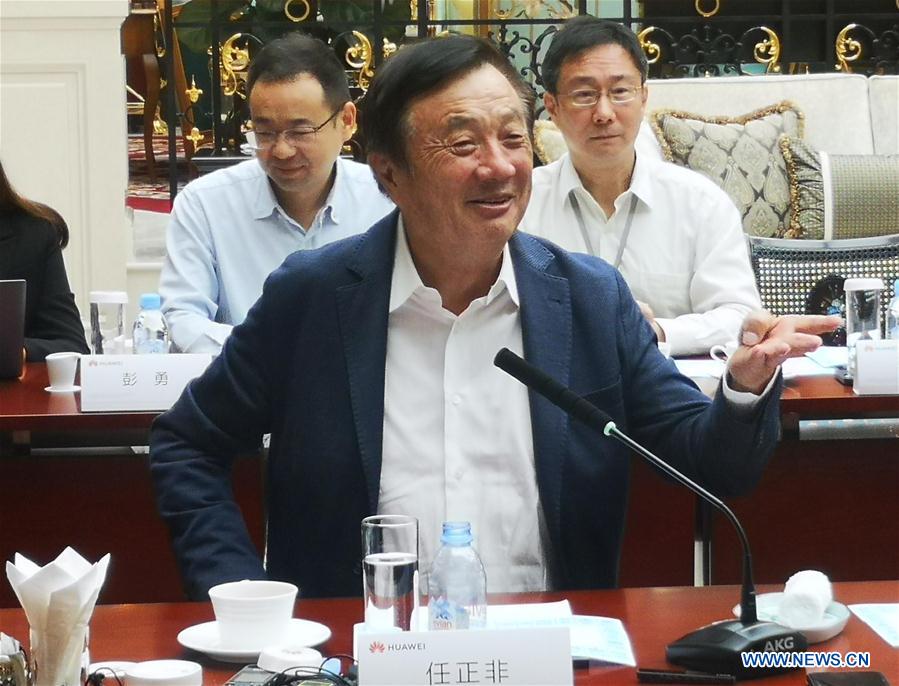Huawei products should not be linked to politics: Ren
 0 Comment(s)
0 Comment(s) Print
Print E-mail Xinhua, May 22, 2019
E-mail Xinhua, May 22, 2019

Huawei is a commercial company, and the use of its products is a choice for consumers based on their likes and should not be linked to politics, said Ren Zhengfei, founder and president of Huawei Technologies Co. Ltd. on Tuesday.
The U.S. Department of Commerce on Monday issued a 90-day temporary license loosening restrictions on business deals with the Chinese telecommunications giant.
The Bureau of Industry and Security of the U.S. Department of Commerce last week put Huawei and its affiliates on an "Entity List," which restricts the sale or transfer of U.S. technologies to the company. The ban has triggered opposition from markets worldwide.
Huawei is lodging a lawsuit against the U.S. government over the previous sanctions and restrictions, Ren told reporters at Huawei's headquarters in Shenzhen.
No negative growth
In response to the temporary license, Ren said what is most important for Huawei to do is to do its own thing well. "We cannot control what the U.S. government will do."
Huawei maintains mass production capacities for specific key components, including chips, and the U.S. ban will not result in negative business growth, Ren said.
Huawei posted 39 percent year-on-year revenue growth in the first quarter of the year. Entering the second quarter, the growth has slowed to 25 percent in April alone.
The slowing will not hurt the company as it projected slower but positive growth this year, Ren said.
Well prepared
Ren said Huawei had recently received widespread global support. Huawei never wants to "walk alone" in the global markets, but has made good preparations for any extreme circumstances, he said.
"Huawei had made preparations for extreme situations even before the Chinese Lunar New Year," he said.
He noted, however, that it would not reject the U.S. supply chain, citing Huawei's announced purchase of 50 million chips from Qualcomm in 2018.
"As long as the U.S. government allows U.S. companies to export the components, Huawei will continue to buy while sticking to its own research and development," he said.
Ren said he appreciated the support of a large number of U.S. components suppliers over the years, and they were also lobbying for the easing of U.S. government-imposed restrictions.
He said Huawei was also in talks with companies like Google for potential remedy solutions, he said.
No impact on 5G
The U.S. restrictions will have an impact on Huawei's low-end products, but will definitely not affect the high-end products, particularly in the 5G sector, Ren said. He added that rivals would not catch up with Huawei's 5G technology in two to three years.
Huawei should not be restricted just because of its leading technology position, Ren.
"Our work is to benefit the whole of humankind," he said, adding that Huawei's 5G equipment would greatly reduce the cost of global telecom networks construction.
R&D spending
Huawei has always respected the intellectual property rights and that U.S. technology has the depth and breadth that Huawei can still learn from, Ren said.
Huawei has established dozens of research and development centers around the world and is still keen on taking part in global scientific research, he said.
Even a setback to the company finances would not affect its spending on the research and development, he said. The firm has thousands of experts in basic research and nearly 70,000 senior engineers.
In response to U.S. questioning over Huawei's governance structure, Ren said Huawei's ownership structure is transparent and in line with Chinese laws. More than 80,000 employees recently participated in an election of employee shareholder representatives, he added.






Go to Forum >>0 Comment(s)